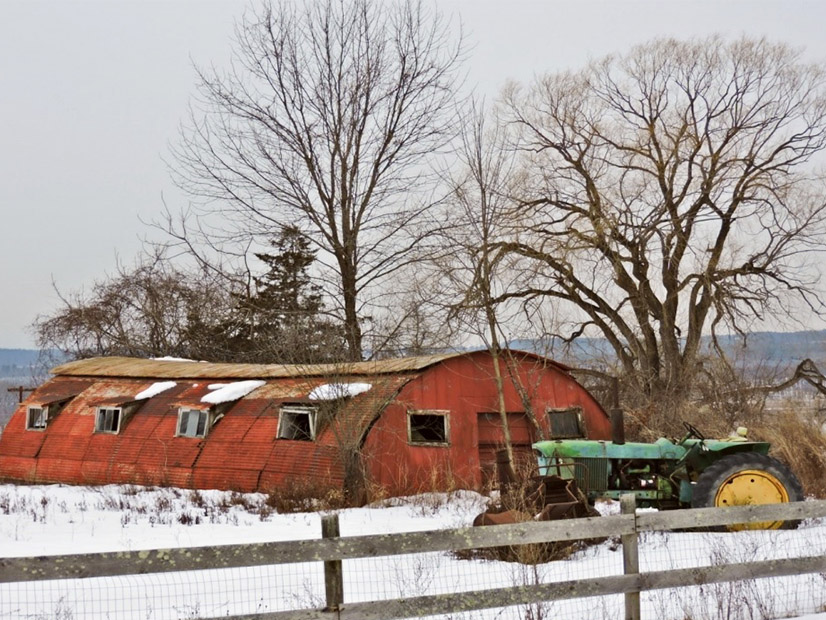
New York state regulators voted Wednesday to waive a local zoning law, clearing the way for construction of the 100-MW Flint Mine Solar project in the Town of Coxsackie.
The decision is among the last that will come out of the state’s 2011 Article 10 facility siting review process.
Traditionally, the Board of Electric Generation Siting and the Environment “has been reluctant” to waive local laws in their decisions, Michael Gerrard, director of the Sabin Center for Climate Change Law, told NetZero Insider.
New York adopted regulations earlier this year that streamline project permitting under the newly formed Office of Renewable Energy Siting. Although applicants could opt-in to the new process, some cases still are moving through the Article 10 permitting process under the siting board.
“Unquestionably, one of the reasons that the legislature adopted the recent statute was because the old Article 10 process wasn’t working,” Gerrard said. “The siting board was rarely, if ever, overriding local zoning, but here they did. And we now have a new process that I think may yield similar results when warranted.”
The board issued an order granting Flint Mine a certificate of environmental compatibility and public need to construct the project on 1,700 acres in the towns of Coxsackie and Athens, granting the developer’s request to waive a law in Coxsackie that prohibits utility-scale solar in any area not zoned as commercial or industrial. The portion of the Flint Mine project in Coxsackie is sited entirely within a residential and agricultural zone.
“Flint Mine has demonstrated that when considered in the context of the requirements of a project developer to find suitable space and to be able to secure rights to use that land, requiring compliance with this local zoning law would prohibit the construction of the project, making application of the law’s restrictions unreasonably burdensome,” Dakin Lecakes, chief administrative law judge of the New York State Department of Public Service, said during the board’s meeting Wednesday.
The board also waived compliance with laws in Athens governing parking lot and access road grade requirements and construction on lands with steep slopes.
“If enforced, those local laws would impose unwarranted burdens on Flint Mine without any corresponding environmental benefits,” Lecakes said.
New York is one of the few states that has a statutory procedure to override local zoning, Gerrard said.
There are many local zoning constraints for renewables across the U.S., he said, adding that “this issue of local opposition has become a major impediment to the massive build out we need of wind and solar.”
Landowners’ Plight
The waiver for the Coxsackie zoning law is the culmination of a multi-year effort by local landowners to find a viable economic outlet for their properties.
A group of landowners in the town decided to sell their properties to project developer Hudson Energy for what would form the foundation of the Flint Mine project, according to the Sabin Center. The town of Coxsackie subsequently passed the zoning law prohibiting large-scale solar in residential and agricultural zones.
The landowners created the Friends of Flint Mine group and began to look for a way to move the project forward.
In 2019, the group, with the support of Gerrard through the Renewable Energy Legal Defense Initiative, sued the town. A New York court dismissed the lawsuit later that year, finding that the zoning law was a valid exercise of local police power.
The following year, the group got together with the project developer and petitioned the town for a special-use permit to build the project. The petitioners told the town that the quality of the project lands, while zoned as agricultural, could no longer sustain farming practices due to poor soil and drainage. They further explained that much of the adjacent lands that also are zoned as residential and agricultural are used for other purposes, such as “correctional institutions and other governmental purposes.”
Town officials did not approve the permit and continued to oppose the project during the siting board’s proceedings.
The town ultimately signed a settlement agreement in the case, but it included a resolution passed May 11 stating its opposition and calling the project “inconsistent with … the rural and historic character of the town.”
The developer will purchase about 90% of the land needed for the project directly from current landowners, resulting in a $15 million infusion to the local economy, according to a statement from the siting board.


